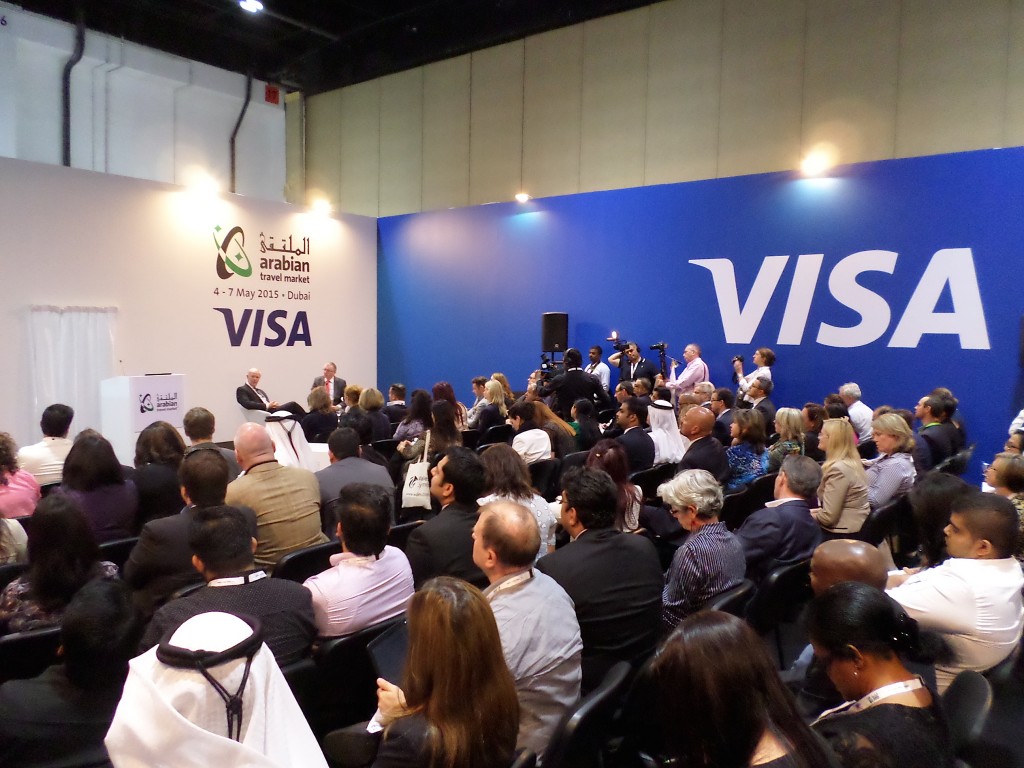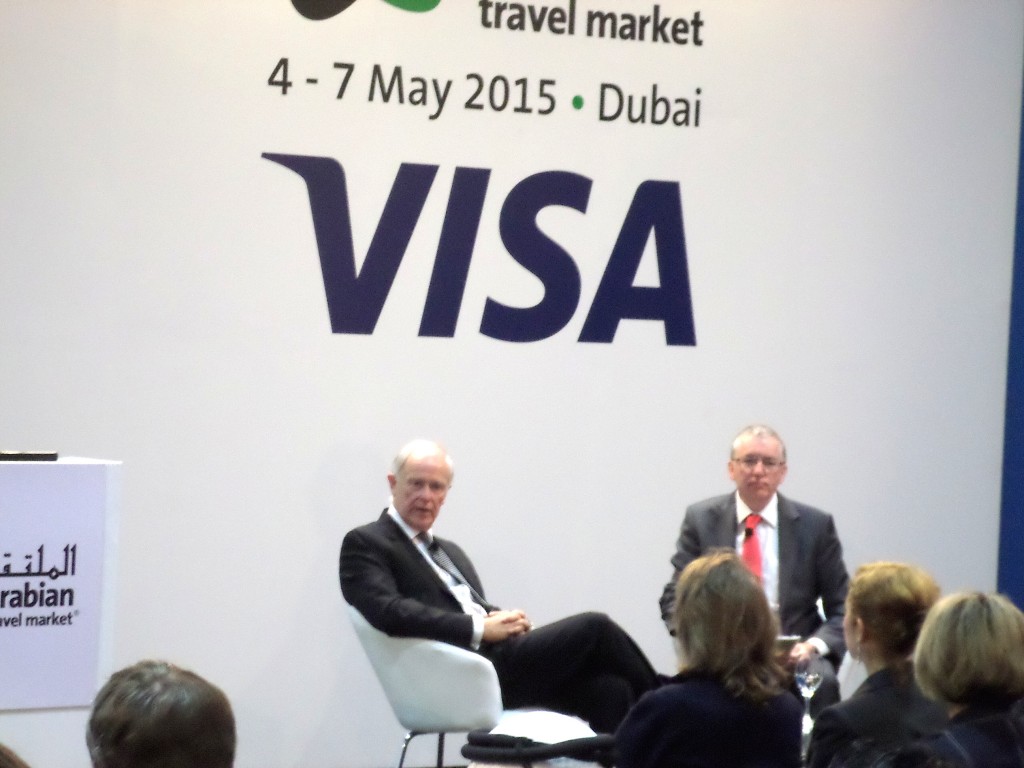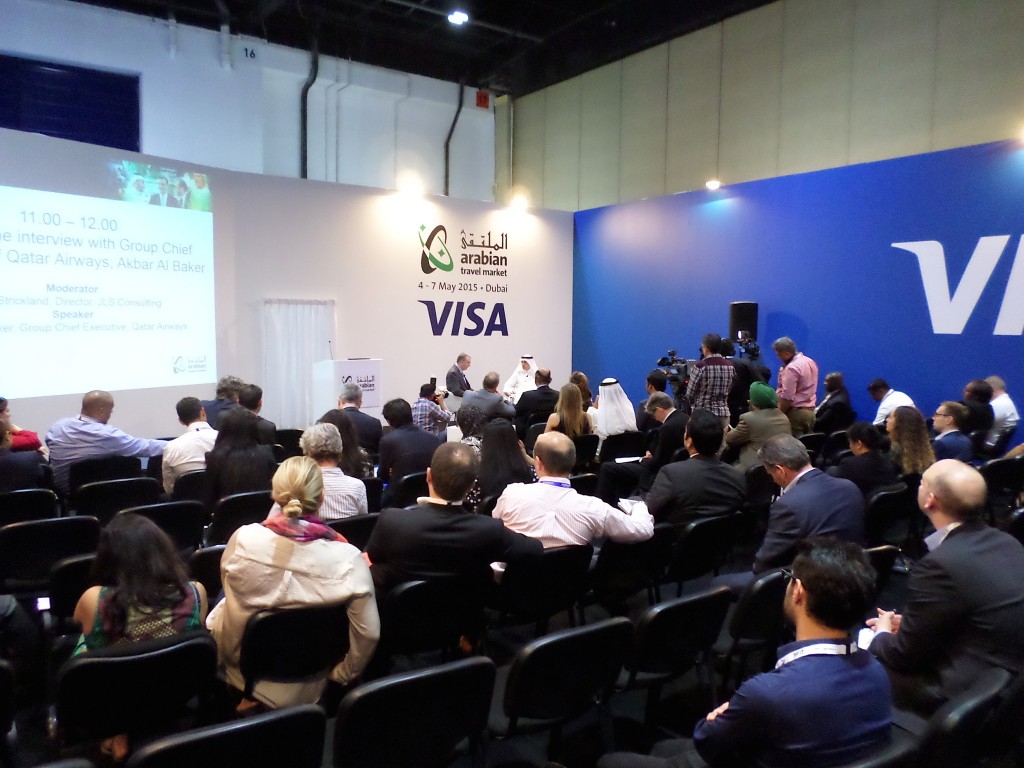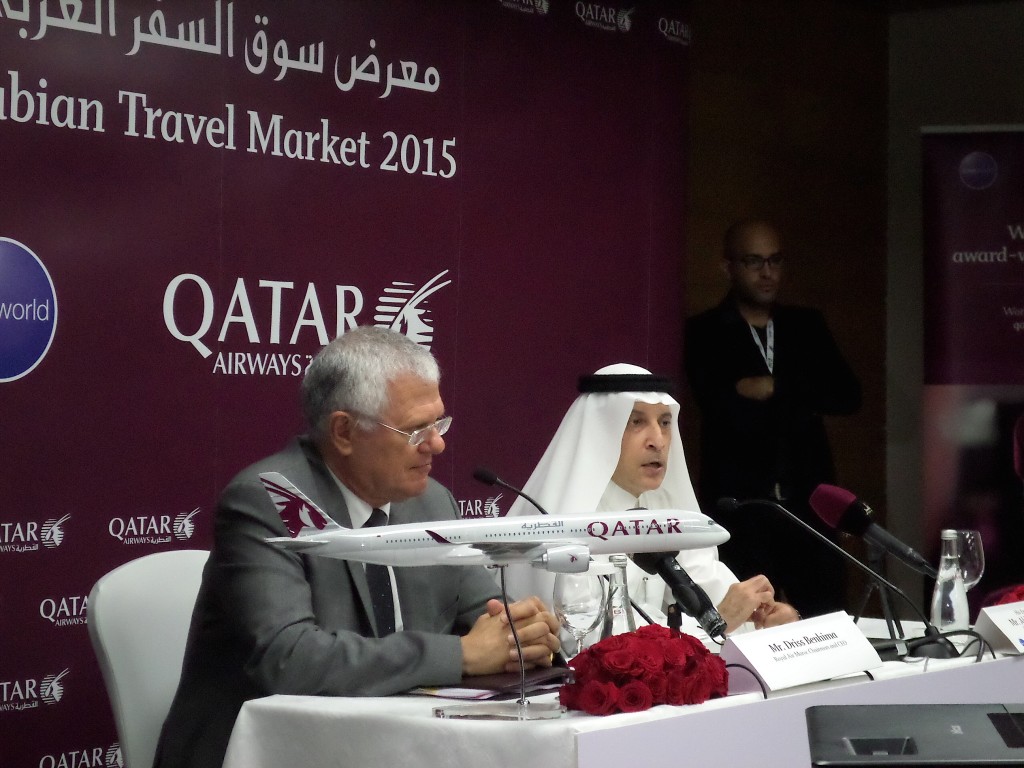
9 May, 2015
At ATM Dubai, Gulf carriers in full battle cry against U.S. airlines’ claims of “subsidies”
Dubai – Chief executives of Etihad, Qatar Airways and Emirates are due in Washington DC for May 14 meetings with U.S. government officials to rebut allegations that their airlines are subsidised by their respective governments, giving them an unfair competitive advantage over U.S. airlines and their code-share and alliance partners.
 Packed crowd at Mr Tim Clark’s interview session |
At the Arabian Travel Market in Dubai last week, the 55-page dossier submitted by a group of U.S. airlines came under fire from Emirates Airlines President Tim Clark and Qatar Airways CEO Akbar Al-Baker. Slamming the report as being a “non-starter”, “cosmetic”, “lies” and “fictitious,” they called on the U.S. government to note that the open-sky model was its own creation and had served both the U.S. and global aviation industry well over the years.
 Mr Clark taking questions from the floor. |
As for the issue of subsidies, Mr. Al-Baker noted that several U.S. airlines themselves had filed for bankruptcy at some stage and should have been shut down. He was referring to the Chapter 11 safeguards that allow them to remain in business and gain protection from their creditors while they “restructure” their debts.
Released in January 2015, the White Paper is entitled “Restoring Open Skies: The Need To Address Subsidized Competition From State-Owned Airlines In Qatar And The UAE”. It says, “Over the past decade, the governments of Qatar, Abu Dhabi and Dubai have formulated economic development strategies that depend in large part on a massive expansion in the flow of international air passenger traffic through their hub cities. And in furtherance of these strategies, they have created vertically-integrated, wholly state-owned aviation sectors that include monopoly service providers and complex interrelationships between their government institutions, airlines, ground handlers, airports, and state-owned banks.
“State-owned Qatar Airways (Qatar), Etihad Airways (Etihad) and Emirates Airline (Emirates) (collectively, the Gulf carriers) are the key instruments of these strategies, so their government owners have fueled their operations and their rapid growth with over $40 billion in subsidies and other unfair government-conferred advantages in the last decade alone.”
The White Paper calls on the U.S. government to renegotiate the agreements on the basis of “comity and reciprocity” and in the event of a failure to do so, to terminate them. Interestingly, the White Paper does not identify who authored and/or compiled it, nor does it identify a single U.S. airline which has been affected, nor does it specify how. The complaints are addressed generically in the name of “U.S. airlines.”
At the Dubai ATM, both Mr. Clark and Mr. Al-Baker responded in separate interviews with aviation consultant John Strickland. Tim Clark spoke first on May 5.
He said he would repeat what he has said twice before in public, that the White Paper is “flim-flam and tosh….You could drive a bulldozer through just about everything they wrote…..We will deal a sledgehammer to that report as far as Dubai is concerned. So watch this space.”
He said the U.S. airlines had by their own admission taken two years to compile the report, and the Gulf airlines must be given equal time to produce what he called a “robust” report. He said all three Gulf carriers “will make their own submissions but I suspect there will be a lot of similarities.”
Providing some historical context, Mr. Clark noted that in the 1990s, the U.S. was moving away from the aeropolitical model known by various names such as Bermuda 1, Bermuda 2, Bermuda 3 which had emerged after World War II. “By the 1990s, the U.S. had decided this was not serving its economic and political aspirations, so they moved the whole aeropolitical process into what is now known as the open sky. As many as 114 agreements were signed worldwide under this open skies model, which stripped out all restrictions that had hitherto curbed aviation growth.”
He said the Americans knew well at the time that many of the countries had state-owned and state-funded airlines. Now, the ability of the U.S. to come back at those countries or those entities is extremely difficult. “They crafted the document. The countries that signed up did not.”
He said, “When I questioned them at the time of the signing of the open skies agreement with the UAE, they absolutely assured me that what they were saying to the UAE was as simple and as pure as was crafted in the document, which was fantastic as this is exactly the kind of aeropolitical environment I would like to operate in.” Hence, he said, “the instrument that determines the movement of airlines and aircraft between multiple points of the U.S. and UAE is driven by their own document. And that is exactly what are we doing, and will continue to do so.”
He said the whole issue of providing subsidies “is a non-starter.”
“We have never been subsidised. We have never received any kind of subsidy or special treatment. We have grown this airline, when I first came in 1985, from nothing to 235-240 aircraft and created an airline that is most probably one of the largest and most successful in global history and we have done that without state funding.”
Emirates now has a balance sheet of US$25 billion, and generates positive cash flow by growing its business. “When somebody tells us that we were subsidised in the process and seeks to identify where we were subsidised, they are talking to the wrong people because we know that our financial statements as verified and audited by Price Waterhouse Coopers are absolutely spot on. The veracity of what we say in those (financial statements) is 100%. If we didn’t, PWC would not sign them. So I sleep relatively easy in my bed with regard to the rebuttal of subsidies.”
Then he challenged the accusers. “But equally, if you are wrong — and we will show you to be wrong, and we will expose those falsehoods to be falsehoods, flimflam and tosh — will you resign, what will you do when the rebuttal comes back to you and shows the stakeholders, the political entities that you managed to orchestrate, that they are fundamentally wrong? Will you go somewhere else?”
Referring to the issue of unfair competition, Mr. Clark said American Airlines does not fly to any points in North Africa nor the Middle East. It flies to many points in Europe, some points in Asia and south America and obviously domestic U.S. points.
“So for them to say we are eating their lunch to the multiple points on which there is no overlap and from which we bring tens of millions of passengers into the U.S. surprised me. Delta has only one flight (to Dubai) from Atlanta. And United has one flight from Washington. They do not go anywhere else. So I would be really interested to know from a competitive point of view, how they can claim that we do them damage.”
He noted that the report says the market shares of their joint-venture partners being affected. “Well, hey guys, market share is not a right, market share is earned and if the quality of our business and our products and the value proposition is a better one, and we can connect people from all the ports that they don’t serve, then why do you do deprive the passengers to continue the right to do that? Why force them over hubs in other places. Why follow convoluted routings when we can go to over one stop.”
“They really need to do little bit more analysis. Too much of the report skims the surface. It is cosmetic. It is qualitative. It is based on innuendo.”
Mr. Clark added, “Remember, Emriates did not start flying to the United States until 2004. Was that to suggest that there were no Indians, Bangladeshis, Iranians or Sri Lankans travelling to U.S. or Canada (before that)? They (the U.S. airlines) chose not to be there. They had the aeropolitical rights to go to any point from Dubai and Abu Dhabi with full fifth freedom. So from them to say that we are taking their markets and compromising their ability to trade is absolutely nonsense.”
Same thing in Africa. Mr. Clark cited points such as Entebbe, Harare, Lusaka and other African cities which are of importance to the U.S., but getting from them to the U.S. is very expensive and convoluted. “If you are travelling via a European hub, you need a visa just to transit. It is a real impediment.”
Referring to the term “opportunistic” in the White Paper, Mr. Clark said, “Opportunistic does not mean we are not going after your carriers to take them down. It means simply just looking at opportunities and taking advantage of them because we can, and being nimble enough to do so.”
Referring to one comment in the White Paper which complains about Emirates flying Milan-New York, a fifth-freedom sector, Mr. Clark said Alitalia itself had decided to stop flying that route, and it was the Italian Prime Minister at the time “who called my boss and said would you help out.”
At a broader level, Mr. Clark appeared to welcome the debate. He said what the world is seeing is the beginning of a fracturing of the current world aviation order, especially the structures and business models that emerged in the 1980s and 1990s. This aeropolitical sea change is forcing a restructuring of even the global airline alliances. Influencing factors include the emergence of a new breed of low cost long haul carriers such as Norwegian and Air Asia, mainstream airlines that are now moving into the low-cost areas, and airlines such as Emirates, Etihad and Qatar Airways whose hub-and-spokes model is also being copied by Turkish Airlines via its Istanbul hub.
He said demand is set to grow strongly over the 21st century, and new market segments are appearing that had not even been contemplated over the last 10 years. The bottom-line would still remain the same: Passengers just want a good value proposition, they want to be looked after, communicated and moved with the technology. “That is of more value to them than being suckered into an alliance because they are going to get miles,” he said.
The following day, Akbar Al-Baker of Qatar Airways responded, saying “after meeting the U.S. government officials, I am going to open the books and confront them (the U.S. airlines).
 Mr Akbar Al-Baker being interviewed |
“I want to say in very clear terms, that Mr. Anderson (Richard Anderson, CEO, Delta Air Lines) is not a patriot for his country because what he is doing is stifling the interests of the traveling public in the U.S.. He is very single-mindedly looking at himself. He is forgetting his own backyard. I am not going to mince my words, I am going to meet the Press and I think Mr. Anderson has never seen a CEO that will be so direct, so insulting and absolutely to the point to expose him. He is working against the interests of his own country. He has no dignity, he has no ethics, he has in my opinion, a weak personality and he is only hiding behind all this nonsense, misleading his government in a big way…”
 Mr Akbar Al-Baker at the Press Conference following the interview. On the left is the CEO of Royal Air Maroc, |
Mr. Al-Baker said that on the issue of subsidies, it is the U.S. airlines which should have been shutdown. “Delta should have been closed a long time ago because they were bankrupt. U.S. Airways — I don’t know why my alliance partner is jumping into this foray — it was bankrupt twice in a period of 18 months. United was bankrupt. So they were all bankrupt. And now they are talking about subsidies with us? Ours (Qatar Airways) is proper government entity under a company that is owned by the sovereign fund of my government. So what’s the problem?”
He added, “When you start flying 767s and 757s and old planes which are 35 years old, and which have stopped production, and fooling your customers, so of course they cannot compete. So they are screaming. I don’t think this argument will stand. I am sure the U.S. government will look at the bigger picture and the interests of the economy and the thousands of jobs we create in the industry, much more than he (Richard Anderson) creates in Delta.”
Another person interviewed separately was Mr. Martin Bentrott, Senior VP Middle East & Africa Sales for Boeing. He was circumspect in his comments, noting that the company policy was to favour both open-sky policies as well as fair competition. He indicated that the U.S. plane-maker was coming under pressure from both sides to bolster their arguments.
However, he did stress that open-skies were good for everyone, the airlines, the travelling public and economies at large. In a conversation later, he was asked to comment on the fair-competition side of the argument. He responded, “How do you define fair competition? There are government-owned airlines all over the world. Just look at Air India.”



Liked this article? Share it!